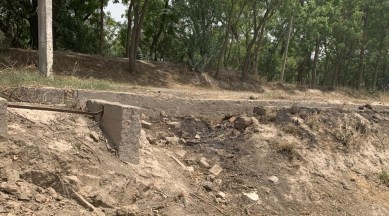Stay updated with the latest - Click here to follow us on Instagram
In Mansa, five villages connected to canal, but do not get a drop to irrigate their fields
The root of this persistent problem lies in the faulty construction of a water course, known as ‘Khal,’ which was built several decades ago to supply canal water to the affected fields.

In a tale of enduring hardship, farmers in Gurne Kalan village, located in the Bhikhi block of Mansa district, have been grappling with a severe water crisis for over seven decades. Despite being included in the canal water supply system, Gurdarshan Singh, a local farmer, has never received a single drop of canal water for his five-acre land situated in the southern part of the village. This unfortunate reality extends to other farmers in the region, including Gurjant Singh, Babu Singh, and Darshan Singh, who are all dependent on tubewell water to irrigate their fields.
The root of this persistent problem lies in the faulty construction of a water course, known as ‘Khal,’ which was built several decades ago to supply canal water to the affected fields. Tragically, the ‘Khal’ was damaged shortly after its completion and has remained unrepaired ever since, rendering it incapable of fulfilling its intended purpose.
Darshan Singh, one of the farmers affected by this issue, revealed that the majority of land in their village has been devoid of canal water for the past 70 years, despite the fact that obtaining it is not an impossibility.
While there is another water course in the village that supplies irrigation to fields in the eastern side, the majority of fields are solely reliant on tubewell water. This has placed an immense burden on groundwater resources and has resulted in exorbitant electricity consumption to operate the tubewells.
Regrettably, this situation is not unique to Gurne Kalan village. Numerous farmers from five villages in the Bhikhi block of Mansa district share the same tale of woe. Approximately 1,800 acres of land in Bodhawal, Phaphrabhaike, Gurnekalan, Gurne Khurd, and Hasanpur villages could be efficiently irrigated through canal water, as multiple ‘Khals’ have been constructed in the area.
However, due to the dilapidated condition of these water courses at several locations, only a fraction of the land, around 100 acres, actually receives canal water.
The farmers in these villages primarily cultivate cotton, paddy, and maize crops during the kharif season. Recognizing the urgent need for a solution, they have recently submitted applications to the Punjab State Tubewell Corporation (now known as the Water Resources Management and Development Corporation) requesting the installation of underground pipelines to their villages, instead of constructing or repairing the open water courses (Khals). Underground pipelines would enable canal water to reach the tail ends of the fields, alleviating the prevailing crisis.
The affected villages fall under the jurisdiction of the Kotla Branch of the Bhikhi Distributary, which is part of the Sirhind Canal system originating from the river Sutlej. Presently, these five villages are connected to l ‘Mogha (a canal connection) number 75950 L. Farmer Darshan Singh said that in 2005, a 10-inch ‘Khal’ was constructed with contributions from the villagers, but due to its low level, the water failed to reach the elevated fields located 6-7 feet higher. Moreover, it suffered damage in the same year, leaving farmers without canal water since then.
Desperate for a viable solution, the farmers of the five villages are urging the Tubewell Corporation to implement an underground pipeline system. However, lack of sufficient funds poses a significant obstacle, as the required stretch of pipeline installation spans approximately 5-6 kilometers.
Speaking with The Indian Express, Gundeep Singh, the Executive Engineer of the Punjab Tubewell Corporation in Mansa, revealed that they have received Rs. 45.88 lakh for the repair work of the ‘Khal’ that passes through the affected villages.
However, in response to the farmers’ demands, they are willing to utilise the available funds to lay underground pipes instead.
“Unfortunately, the allocated funds are not sufficient to cover the entire length of 5-6 kilometres. With the available amount, we can only cover approximately 2-2.5 kilometres. The remaining work can be taken up by the Punjab Soil Conservation department,” explained Gundeep Singh.
Farmers in the region expressed their hope that Punjab Chief Minister Bhagwant Mann, who has shown concern for groundwater conservation, will intervene in the matter. They emphasised that this task is not arduous and does not require a substantial amount of funding. Additionally, officials from the soil conservation department have expressed their willingness to undertake the remaining work, provided they receive a non-objection certificate (NOC) from the government.
“We, the farmers, are not highly educated individuals who can navigate between different departments. The government should step in and resolve this issue as soon as possible,” stated Gurjant Singh. He further underlined the importance of promoting every measure to conserve water, especially as Punjab’s groundwater levels continue to decline each year, and there are real fears of it drying up within the next two decades.